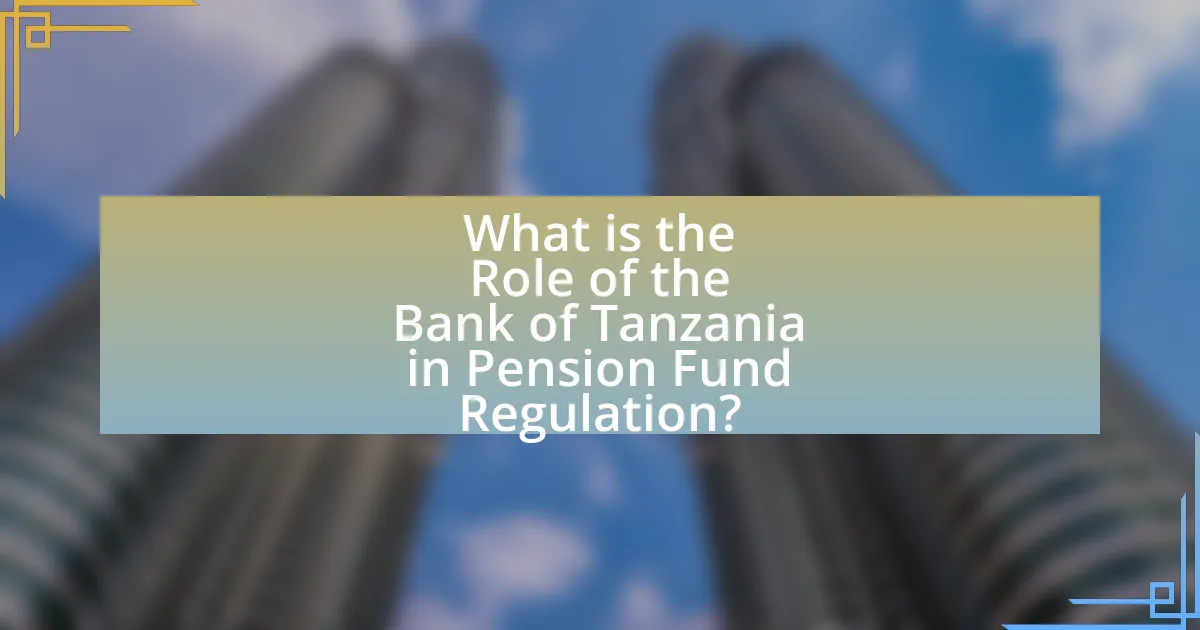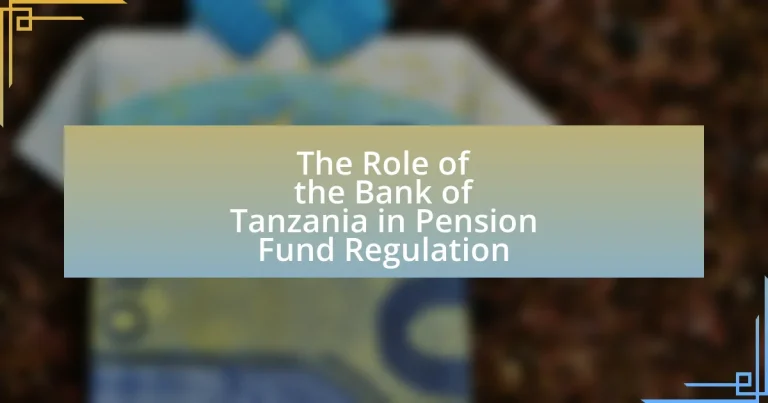The Bank of Tanzania is the primary regulatory authority overseeing pension funds in Tanzania, tasked with ensuring financial stability and protecting the interests of pension fund members. The article outlines the Bank’s role in enforcing compliance with laws such as the National Pension Act, conducting audits, and establishing regulatory frameworks that govern pension fund operations. Key topics include the Bank’s oversight mechanisms, objectives of pension fund regulation, challenges faced in compliance, and the impact of economic factors on pension fund strategies. Additionally, the article discusses the importance of public awareness, technology integration, and best practices for enhancing transparency and accountability within the pension fund sector.

What is the Role of the Bank of Tanzania in Pension Fund Regulation?
The Bank of Tanzania plays a crucial role in the regulation of pension funds by ensuring financial stability and protecting the interests of pension fund members. It oversees the compliance of pension funds with relevant laws and regulations, such as the National Pension Act, which mandates that pension funds maintain adequate reserves and adhere to investment guidelines. The Bank also conducts regular audits and assessments of pension fund operations to ensure transparency and accountability, thereby safeguarding the financial health of these funds and the benefits of their members.
How does the Bank of Tanzania oversee pension funds?
The Bank of Tanzania oversees pension funds by regulating their operations, ensuring compliance with relevant laws, and monitoring their financial health. This oversight includes setting prudential guidelines that pension funds must follow, conducting regular audits, and requiring pension funds to submit financial reports. The Bank also evaluates the investment strategies of these funds to safeguard members’ contributions and ensure long-term sustainability. This regulatory framework is essential for maintaining the integrity of the pension system and protecting the interests of beneficiaries.
What regulatory frameworks are established by the Bank of Tanzania?
The Bank of Tanzania has established several regulatory frameworks, including the Banking and Financial Institutions Act, the National Payment Systems Act, and the Foreign Exchange Act. These frameworks govern the operations of financial institutions, ensure the stability of the banking sector, and regulate payment systems and foreign exchange transactions. The Banking and Financial Institutions Act, for instance, provides guidelines for licensing, supervision, and regulation of banks and financial institutions, ensuring compliance with prudential standards. The National Payment Systems Act facilitates secure and efficient payment systems, while the Foreign Exchange Act regulates foreign currency transactions to promote a stable economic environment.
How does the Bank of Tanzania ensure compliance among pension funds?
The Bank of Tanzania ensures compliance among pension funds through a robust regulatory framework that includes regular supervision, reporting requirements, and adherence to established guidelines. The Bank conducts periodic audits and assessments of pension funds to verify their financial health and compliance with the Pension Act and related regulations. Additionally, the Bank mandates that pension funds submit detailed financial reports and investment strategies, which are reviewed for adherence to risk management and investment policies. This systematic oversight is supported by the Bank’s authority to impose penalties for non-compliance, thereby reinforcing accountability within the pension fund sector.
What are the objectives of pension fund regulation by the Bank of Tanzania?
The objectives of pension fund regulation by the Bank of Tanzania include ensuring the safety and soundness of pension funds, protecting the interests of members and beneficiaries, and promoting the development of a sustainable pension system. The Bank of Tanzania aims to achieve these objectives by establishing regulatory frameworks that enforce compliance, enhance transparency, and ensure proper governance within pension funds. This regulatory oversight is crucial for maintaining public confidence in the pension system and safeguarding the financial security of retirees.
Why is financial stability important in pension fund regulation?
Financial stability is crucial in pension fund regulation because it ensures the long-term viability and reliability of pension systems. A stable financial environment allows pension funds to meet their obligations to beneficiaries, as it minimizes the risk of insolvency and protects against market volatility. For instance, during economic downturns, stable regulations can help maintain adequate funding levels and prevent significant losses that could jeopardize retirees’ income. Furthermore, the International Monetary Fund emphasizes that financial stability contributes to overall economic growth, which is essential for the sustainability of pension funds.
How does the Bank of Tanzania protect pension fund members?
The Bank of Tanzania protects pension fund members by implementing regulatory frameworks that ensure the financial stability and transparency of pension funds. This includes conducting regular audits and assessments of pension fund management practices to safeguard members’ contributions. Additionally, the Bank enforces compliance with investment guidelines that limit risks and promote prudent investment strategies, thereby securing the assets of pension fund members. The Bank also provides oversight to ensure that pension funds maintain adequate liquidity to meet member withdrawal requests, further enhancing the protection of members’ interests.
What challenges does the Bank of Tanzania face in pension fund regulation?
The Bank of Tanzania faces several challenges in pension fund regulation, primarily including inadequate regulatory frameworks, limited data on pension fund performance, and issues related to compliance and enforcement. The regulatory frameworks often lack specificity, making it difficult for the Bank to effectively oversee pension funds. Additionally, the scarcity of reliable data hampers the Bank’s ability to assess the financial health and performance of these funds, which is crucial for informed decision-making. Compliance issues arise from the varying levels of understanding and adherence to regulations among pension fund managers, complicating the enforcement of standards. These challenges hinder the Bank’s capacity to ensure the stability and sustainability of the pension fund sector in Tanzania.
How do economic factors impact pension fund regulation?
Economic factors significantly impact pension fund regulation by influencing investment strategies, funding levels, and risk management practices. For instance, fluctuations in interest rates affect the returns on fixed-income investments, which are crucial for pension funds. When interest rates are low, pension funds may struggle to meet their future liabilities, prompting regulators to adjust funding requirements or investment guidelines. Additionally, economic growth rates can determine the overall health of pension fund contributions; during economic downturns, reduced employment can lead to lower contributions, necessitating regulatory responses to ensure fund solvency. Historical data shows that during the 2008 financial crisis, many pension funds faced underfunding issues, leading to regulatory changes aimed at enhancing oversight and risk assessment.
What are the implications of regulatory non-compliance for pension funds?
Regulatory non-compliance for pension funds can lead to significant financial penalties and reputational damage. When pension funds fail to adhere to regulations set by authorities such as the Bank of Tanzania, they may face fines that can severely impact their financial stability. For instance, non-compliance can result in increased scrutiny from regulators, leading to potential audits and further legal actions. Additionally, pension funds may experience a loss of trust from beneficiaries and stakeholders, which can diminish their ability to attract new investments. Historical data indicates that pension funds that have faced regulatory issues often see a decline in member confidence, which can adversely affect their long-term viability.
How does the Bank of Tanzania collaborate with other institutions in pension fund regulation?
The Bank of Tanzania collaborates with other institutions in pension fund regulation by engaging in joint efforts with the Ministry of Finance, the Social Security Regulatory Authority, and various pension funds to ensure compliance with regulatory frameworks. This collaboration includes sharing data, conducting joint assessments, and developing policies that enhance the stability and efficiency of the pension sector. For instance, the Bank of Tanzania participates in the formulation of guidelines that govern pension fund investments, ensuring alignment with national economic goals and financial stability.
What role does public awareness play in pension fund regulation?
Public awareness plays a crucial role in pension fund regulation by ensuring that stakeholders, including beneficiaries and policymakers, are informed about their rights and responsibilities. Increased public awareness leads to greater scrutiny of pension fund operations, which can enhance transparency and accountability. For instance, when individuals understand the importance of pension savings and the regulatory framework, they are more likely to engage with their pension funds, advocate for better management, and report any irregularities. This heightened engagement can result in improved regulatory compliance and better protection of beneficiaries’ interests, as evidenced by studies showing that informed participants are more likely to monitor fund performance and demand accountability from fund managers.

What specific regulations does the Bank of Tanzania implement for pension funds?
The Bank of Tanzania implements specific regulations for pension funds primarily through the Pension Funds Act of 2008 and its subsequent amendments. These regulations govern the establishment, management, and operation of pension funds, ensuring they adhere to standards of financial stability, transparency, and member protection. For instance, the regulations require pension funds to maintain a minimum capital requirement, conduct regular audits, and submit annual reports to the Bank of Tanzania. Additionally, the Bank oversees investment guidelines that dictate how pension funds can allocate their assets, promoting diversification and risk management. These measures are designed to safeguard the interests of pension fund members and ensure the sustainability of the pension system in Tanzania.
What types of pension funds are regulated by the Bank of Tanzania?
The Bank of Tanzania regulates several types of pension funds, including mandatory pension funds, voluntary pension funds, and occupational pension schemes. Mandatory pension funds are required by law for employees in the formal sector, while voluntary pension funds are established by individuals or employers on a non-mandatory basis. Occupational pension schemes are specific to certain professions or industries and are designed to provide retirement benefits to employees within those sectors. These regulations ensure that pension funds operate within a framework that promotes financial stability and protects the interests of contributors.
How do defined benefit and defined contribution plans differ in regulation?
Defined benefit and defined contribution plans differ significantly in regulation, primarily in their funding requirements and fiduciary responsibilities. Defined benefit plans are regulated under stricter funding rules, requiring employers to ensure that sufficient assets are available to meet future liabilities, as mandated by the Employee Retirement Income Security Act (ERISA) in the United States. In contrast, defined contribution plans place the onus of funding on employees and do not require employers to guarantee a specific benefit at retirement, leading to less regulatory oversight. This distinction is crucial as it affects how pension funds are managed and the level of protection afforded to participants.
What are the reporting requirements for pension funds?
Pension funds are required to submit annual financial statements, which include balance sheets, income statements, and cash flow statements, to the Bank of Tanzania. These reports must comply with International Financial Reporting Standards (IFRS) and provide a clear overview of the fund’s financial position and performance. Additionally, pension funds must submit actuarial valuations every three years to assess the adequacy of their funding levels and ensure they can meet future obligations. This regulatory framework is established to enhance transparency and protect the interests of beneficiaries, ensuring that pension funds operate in a financially sound manner.
How does the Bank of Tanzania monitor the performance of pension funds?
The Bank of Tanzania monitors the performance of pension funds through a regulatory framework that includes regular reporting requirements and performance assessments. Specifically, pension funds are mandated to submit financial statements and investment reports to the Bank, which allows for ongoing evaluation of their financial health and compliance with established regulations. Additionally, the Bank conducts periodic audits and assessments to ensure that pension funds adhere to investment guidelines and risk management practices, thereby safeguarding the interests of members and beneficiaries. This structured oversight is essential for maintaining the stability and integrity of the pension fund sector in Tanzania.
What metrics are used to assess pension fund performance?
Metrics used to assess pension fund performance include the rate of return, risk-adjusted return, funding ratio, and expense ratio. The rate of return measures the investment gains relative to the fund’s assets over a specific period, indicating overall performance. Risk-adjusted return evaluates returns in relation to the risk taken, often using metrics like the Sharpe ratio. The funding ratio compares the fund’s assets to its liabilities, providing insight into its financial health. The expense ratio assesses the costs associated with managing the fund, impacting net returns. These metrics collectively offer a comprehensive view of a pension fund’s effectiveness and sustainability.
How does the Bank of Tanzania respond to underperforming pension funds?
The Bank of Tanzania responds to underperforming pension funds by implementing regulatory measures and providing guidance to improve their performance. Specifically, the Bank conducts regular assessments of pension fund performance and may require funds to submit recovery plans if they fall below performance benchmarks. Additionally, the Bank offers technical assistance and training to pension fund managers to enhance their investment strategies and operational efficiency. This proactive approach aims to safeguard the interests of pension fund members and ensure the stability of the pension system in Tanzania.
What are the consequences of failing to adhere to pension fund regulations?
Failing to adhere to pension fund regulations can result in significant financial penalties and legal repercussions for the responsible entities. Regulatory bodies, such as the Bank of Tanzania, impose fines and sanctions to ensure compliance, which can include monetary penalties that may reach millions of Tanzanian shillings. Additionally, non-compliance can lead to the revocation of licenses to operate pension funds, severely impacting the ability of organizations to manage retirement savings. Historical data indicates that in 2020, the Bank of Tanzania imposed fines on several pension funds for regulatory breaches, highlighting the enforcement of compliance measures. Furthermore, failure to comply can erode trust among stakeholders, including employees and beneficiaries, potentially leading to a decline in participation in pension schemes.
What penalties can be imposed on non-compliant pension funds?
Non-compliant pension funds can face various penalties, including financial fines, restrictions on operations, and potential revocation of licenses. The Bank of Tanzania, which regulates pension funds, imposes these penalties to ensure adherence to the Pension Act and related regulations. For instance, fines can be levied for failure to submit required reports or for mismanagement of funds, while operational restrictions may include limitations on investment activities. In severe cases, the Bank may revoke a pension fund’s license, effectively ceasing its operations. These measures are designed to protect the interests of pension fund members and maintain the integrity of the pension system in Tanzania.
How does the Bank of Tanzania handle violations of pension fund regulations?
The Bank of Tanzania addresses violations of pension fund regulations through a structured enforcement mechanism that includes investigations, penalties, and corrective measures. When a violation is identified, the Bank conducts thorough investigations to ascertain the extent of the breach and the responsible parties. Depending on the severity of the violation, the Bank may impose financial penalties, revoke licenses, or take legal action against the offending entities. Additionally, the Bank emphasizes compliance by providing guidance and support to pension fund managers to ensure adherence to regulations, thereby promoting a stable and secure pension fund environment.

How does the Bank of Tanzania adapt to changes in the pension landscape?
The Bank of Tanzania adapts to changes in the pension landscape by implementing regulatory frameworks that align with evolving economic conditions and demographic trends. This includes updating policies to enhance the sustainability and efficiency of pension funds, ensuring they meet the needs of a growing and aging population. For instance, the Bank has introduced measures to improve investment strategies for pension funds, allowing for diversification and better risk management. Additionally, the Bank conducts regular assessments of the pension sector to identify challenges and opportunities, facilitating timely adjustments to regulations. These actions are supported by data from the National Bureau of Statistics, which highlights demographic shifts and economic indicators relevant to pension planning.
What trends are influencing pension fund regulation in Tanzania?
Trends influencing pension fund regulation in Tanzania include increased emphasis on financial literacy, the integration of technology in fund management, and the push for greater transparency and accountability. Financial literacy initiatives aim to educate both fund managers and beneficiaries, enhancing understanding of pension products and services. The adoption of technology, such as digital platforms for fund management and member engagement, is streamlining operations and improving efficiency. Additionally, regulatory bodies are advocating for enhanced transparency measures, requiring pension funds to disclose more information to stakeholders, thereby fostering trust and compliance within the sector. These trends collectively aim to strengthen the regulatory framework and improve the overall performance of pension funds in Tanzania.
How is technology impacting pension fund management and regulation?
Technology is significantly transforming pension fund management and regulation by enhancing data analytics, improving operational efficiency, and increasing transparency. Advanced data analytics tools enable pension funds to better assess risks and optimize investment strategies, leading to improved returns. Automation of administrative processes reduces operational costs and minimizes human error, allowing fund managers to focus on strategic decision-making. Furthermore, technology facilitates real-time reporting and compliance monitoring, which enhances regulatory oversight and ensures adherence to legal requirements. For instance, the adoption of blockchain technology in pension funds can provide secure and transparent transaction records, thereby increasing trust among stakeholders.
What demographic changes are affecting pension fund strategies?
Aging populations and declining birth rates are significant demographic changes affecting pension fund strategies. As life expectancy increases, pension funds face greater liabilities due to longer payout periods, necessitating adjustments in investment strategies to ensure sustainability. For instance, in many developed countries, the ratio of working-age individuals to retirees is decreasing, which can strain pension systems reliant on current workers’ contributions. According to the World Bank, by 2050, the global population aged 65 and older is projected to reach 1.5 billion, highlighting the urgency for pension funds to adapt their strategies to manage increased longevity risk and ensure adequate funding for future retirees.
What best practices can pension funds adopt to comply with regulations?
Pension funds can adopt several best practices to comply with regulations, including implementing robust governance structures, conducting regular compliance audits, and ensuring transparent reporting. Establishing a governance framework that includes a board of trustees with clear roles and responsibilities helps ensure accountability and adherence to regulatory requirements. Regular compliance audits, conducted by independent third parties, can identify potential regulatory breaches and facilitate timely corrective actions. Additionally, transparent reporting practices, such as disclosing investment strategies and performance metrics, enhance stakeholder trust and align with regulatory expectations. These practices are essential for maintaining compliance and fostering a sustainable pension fund environment.
How can pension funds improve transparency and accountability?
Pension funds can improve transparency and accountability by implementing robust reporting standards and enhancing stakeholder communication. By adopting international financial reporting standards (IFRS), pension funds can provide clearer and more consistent financial information, which facilitates better understanding among stakeholders. Additionally, regular audits by independent third parties can ensure that the funds’ operations and financial statements are accurate and trustworthy. According to the International Organization of Pension Supervisors, transparency in pension fund operations can lead to increased trust and confidence among beneficiaries, ultimately enhancing the overall governance of the funds.
What strategies can pension funds implement to enhance member engagement?
Pension funds can enhance member engagement by implementing personalized communication strategies, utilizing digital platforms for accessibility, and providing educational resources about retirement planning. Personalized communication, such as tailored emails or newsletters, helps members feel valued and informed about their specific benefits and options. Digital platforms, including mobile apps and websites, allow members to easily access their account information and engage with fund services at their convenience. Additionally, offering educational resources, such as webinars and workshops, empowers members with knowledge about their retirement savings, fostering a sense of ownership and involvement in their financial future. These strategies have been shown to increase member satisfaction and participation rates in pension plans.
What practical steps can pension fund managers take to align with the Bank of Tanzania’s regulations?
Pension fund managers can align with the Bank of Tanzania’s regulations by implementing robust compliance frameworks that adhere to the specific guidelines set forth by the Bank. This includes regularly reviewing and updating investment policies to ensure they meet the regulatory requirements, conducting thorough risk assessments, and maintaining transparent reporting practices. Additionally, pension fund managers should engage in continuous training for their staff on regulatory changes and best practices, ensuring that all operations are in line with the Bank’s expectations. Regular audits and consultations with legal experts can further reinforce compliance and mitigate risks associated with regulatory breaches.




